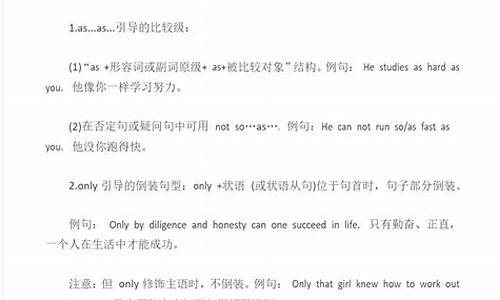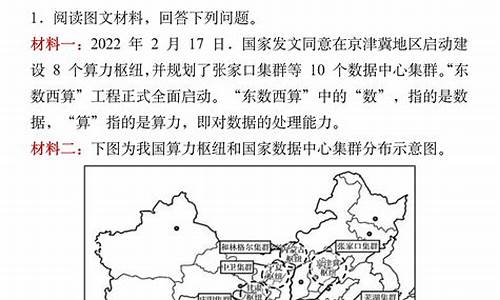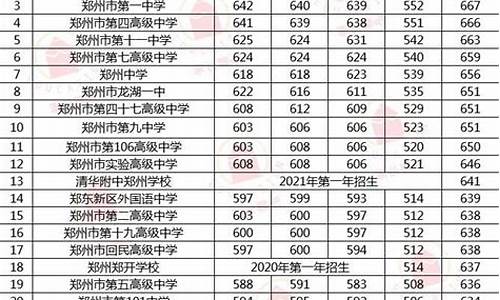您现在的位置是: 首页 > 教育比较 教育比较
高考英语必背知识点归纳2021_高考英语必背知识点
tamoadmin 2024-05-31 人已围观
简介1.近年高考英语都在考的单词/短语,你背下来了吗?2.高考英语语法填空必背知识3.英语备考资料:高考英语3500词4.高三英语基本基础知识点概括5.成人高考英语知识点必考单词整理6.江苏高考英语知识点 高三马上临近高考,那么高三英语语法知识点有哪些呢。以下是由我为大家整理的“高三英语语法知识点总结”,仅供参考,欢迎大家阅读。 高三英语语法知识点总结 一、关系代词引导的定语从句 1、t
1.近年高考英语都在考的单词/短语,你背下来了吗?
2.高考英语语法填空必背知识
3.英语备考资料:高考英语3500词
4.高三英语基本基础知识点概括
5.成人高考英语知识点必考单词整理
6.江苏高考英语知识点

高三马上临近高考,那么高三英语语法知识点有哪些呢。以下是由我为大家整理的“高三英语语法知识点总结”,仅供参考,欢迎大家阅读。
高三英语语法知识点总结一、关系代词引导的定语从句
1、that 指人或物在从句中作主语,宾语或表语
which 指物在从句中作主语,宾语或表语(作宾语时可以省略)
who 指人在从句中作主语,宾语或表语
whom 指人在从句中作宾语
whose 指人或物在从句中作定语
as 指人或物在从句中作主语,宾语或表语
but 指人或物在从句中作主语,宾语或表语
注意:指物时,whose+名词=the+名词+of which或 of which+the+名词
2、as 的用法
(1)常用于下列结构:such…as; so…as;the same…as; as…as
注意:the same…as 表示同一类,不同一个
the same…that 表示同一个
(2)as与which的区别
a、位置不同
as可放在主句后,主句前或主句中间;which只能放在主句后。
b、as起连接作用,表达说话人的观点、看法,并指出主句内容的根据或出处,意为“正如,正像”。
Which相当于并列句,可以用and this来代替,意为“这一点,这件事’”。
注意:as常用于下列结构:as we know/ as is known to all, as we all can see, as has been said before/above,
as might be excepted, as is often the case, 一般不能用which代替as。
c、在从句中作主语时,which既可作系动词be的主语也可作实义动词的主语,而as只可作系动词be的主语。
二、只用that不用which的情况
1、.先行词为 all , much, everything, nothing , something ,anything, nothing, none, the one等不定代词时
2、先行词被only, any, few, little, no , all, just , very ,right等修饰时.
3、 当先行词是最高级或被形容词最高级修饰时。
4、 当先行词是序数词或被序数词修饰时。
5、当先行词是数词时.
6、 当先行词既指人又指物时。
7、如有两个定语从句,其中一个关系代词已用which,另一个关系代词则宜用 that。
8、主句是There be结构,修饰其主语的定语从句宜用that 作关系代词。
9、被修饰成分为表语,或者关系代词本身是定语从句的表语时,该关系代词宜用that。
10、先行词为what,关系代词用that。
11、有时为了避免重复而使用that引导定语从句。
三、只用which不用that的情况
1、 当介词放在关系代词之前时。
2、 在非限制性定语从句中。
3、 当关系代词指整个主句的概念时。
拓展阅读:高考英语各题型复习方法一、听力
听力属于考试必拿分。如果听力还失分,则需要多加练习,最好保证每天听20-30分钟,可以通过听课内课文或者课外的英语文章亦或英文歌曲都会有所帮助的。
切记:听力的提高在于坚持。
二、单项选择
单项选择综合考察同学们对高中语法的把握程度,是必拿分。主要包括三大考点(动词时态语态、非谓语动词、三大从句)及几个小考点(情态动词及虚拟语气、特殊句式、介词、代词)。
第一、同学们一定要将各个语法点系统掌握,搭建知识网。
现在还有部分同学面对众多语法知识点而迷茫着,建议同学们在一轮复习仅剩的一个月时间里,试着通过思维导图的方式,并借助靠谱的语法书。
例如:《五三》、《无敌英语语法》,将语法点进行梳理;同时需要针对性地练习,提高做题效率;
第二、相信各位同学都有准备一本单选订错本,但是我发现有许多同学仅仅只是将题和答案记下,并无订错痕迹,之后还很有可能再错,那么同学们就需要找找原因何在。
在此希望大家将错题可以及时分考点集中誊抄,并写下做错原因,以防后期再错。发挥好订错本的真正作用。
切记:扎实的基础乃致胜高考之利器。
三、完形填空
面对完形,同学们需要注意做题“在精,不在多”。建议同学们可以保证每天或者隔天一定会练习完形填空。
如果练习中丢分比较多,就需要分析丢分的原因,到底是上下文理解的问题,还是词汇记忆准确度不够,或是粗心导致的呢?前期千万不要陷入题海战术中,在做题过程中结合所掌握的知识点,慢慢积累,尔后调整做题习惯。
完形解题包括读懂文章以及选对选项。
那么第一步便是,把握文章的体裁。例如:记叙文的“夹叙夹议”,分析中需要注意对故事发展的脉络和掺杂其中的感情进行把握。
第二步,根据上下文线索,结合平时所积累的熟词僻意、固定搭配等选择正确选项,同时还需要注意优先选择最佳选项。
切记:主要还是从一道完形出发细致分析,将各不同考法的思路进行归纳,转化成经验。
四、阅读理解
对于不同的文体阅读和不同的题型各有相对应的答题技巧,你注意到了吗?
在练习过程中,同学们首先可以先大致将文章略读,了解其文体和大意,其次根据具体问题具体分析,精读文章与问题相关的部分。
细节题注意“读、划、定、比”,主旨大意题需要根据首尾段、首尾句判断,推断题注意只推一步,猜词题需要结合上下文等等。
针对7选5阅读,同学们需注意在练习中提高前后文联系和关键词匹配能力。
切记:阅读是否能够看懂,除了要理解长句,剩下的就是解决单词。如果你所掌握的词汇基础远超高中,高考应该就不在话下了。阅读理解题,词汇为本,方法技巧为王。
五、写作
对于英语作文,素材&词汇&句型等都需要平时的积累。作文的话题并不是一尘不变的,一定要以素材的积累作为写作的中坚力量。
平时练习完毕,同学们一定要在老师的帮助下将作文不断修改和完善,规范审题流程及写作格式。
从应用文上看,需要同学们将各文体作文的写作模板进行熟悉;情景作文上,则需要积累高级词汇及句式,内容上情景交融、形式上长短句结合、过渡词适当、词汇使用准确和地道。
当然,素材的积累目的是为了使用,因此实际运用到写作上才能将素材真正地为我所用,在平时练习中一定要注意多借鉴和使用素材。
想要得到高分,细节也很重要,字迹需清晰,注意不要犯语法错误。高考作文的话题会跟随时代潮流进行更新,需要平时多留意时事。
切记:“清晰、准确、套路”在写作中很重要,需要多上心。
近年高考英语都在考的单词/短语,你背下来了吗?
本文是 考 网写作翻译频道 为您准备的《高考英语重要知识点:写作重点句型》请大家参考!
(1)、疑问词+ever whatever, whoever, whichever, whenever,
wherever, however用来引导让步状语从句,相当于no matter和what, who, which, when, where, how连用。
[例句]
Whatever (=No matter what) may happen, we shall not lose hope.
无论发生什么事,我们都不能失去希望。
Whatever reasons you (may) have, you should carry out a promise. 无论你有什么理由,你都应该遵守诺言。
Whoever (=No matter who) comes, he will be warmly welcome. 无论谁来,都会受到热烈欢迎。
Whenever (=No matter when) it happened, it was certainly not yesterday.
此事无论发生在何时,但绝不是昨天。
Whenever you (may) call, you will find her sitting by the window. 无论什么时候你去找她,你都会看到她坐在窗边。
Wherever (=No matter where) he went, he made friends with people.
Whichever (=No matter which) of them you many choose, the quality will be the same.
他们当中不论你选哪一个,品质都一样。
However (=No matter how) hard I have tried, I can't find the answer.
(2)、whatever, whoever, whichever, whomever等引导名词性从句,这时不能用no matter+疑问词替换。
[例句]
Take whichever you want. 你要哪个就拿哪个。
We will do whatever we can to help him out. 我们要尽力帮助他摆脱困境。
I'll show you whatever you want to see. 你想看什么我就给你看什么。
Whoever did this job must be rewarded. 无论谁做这件事都要得到报酬。
Whoever walks around in such a heavy rain will catch a cold. 任何人在这种大雨中行走都会患感冒。
You may invite whomever(口语中常用whoever代替)you like to the party. 你可以邀请你喜欢的人来参加晚会。
Take whatever magazines you want to read. 你可以取阅任何你想读的杂志。
倒装结构
句型22
全倒装句型(一)
here, there, out, in, up, down, now, then, away等副词放在句首,句子需要全部倒装
[例句]
There goes the bell! = The bell is ringing. 铃响了!
Here comes the bus. =The bus is coming. 汽车来了。
Now comes your turn to make a short speech. 该轮到你发言了。
Away went the thief when he saw the police.
Then came the hour we had been looking forward to. 我们期盼的时候到了。
[注意]
(1)在这种情况下倒装仅限于不及物动词或be动词,像go, come, rush, live, stand, lie等。
(2)主语是人称代词时不要倒装。如:Away he went. 他走远了。
句型23
全倒装句型(二)
表示方位的状语放在句首,句子全倒装;谓语动词多为be, lie, stand, sit, come, walk, run, stop etc. 不及物动词。
[例句]
On a hill in front of them stands a great castle. 在他们面前的山上矗立着一座巨大的城堡。
In front of the house stopped a police car. 房子的全面停着一辆警车。
Around the corner walks a young policeman. 拐角处有个年轻的警察在行走。
Under the tree sat a boy of about ten. 在树下坐着一个大约10岁的男孩。
句型24
全倒装句型(三)
(表语)adj. / v-ing / v-ed +(地点状语)+ be(或其他动词形式)…
So adj./adv…that…如此……以至于……(so引导的句子倒装,而that引导的句子不倒装!) (这种结构是半倒装句。)
[例句]
Present at the meeting were the manager, all the designers and the writer. 出席会议的有经理,设计师和词作者。
Fastened to the pole is the National flag. 旗杆上有一面国旗。
Hidden behind the door were some naughty children. 有几个顽皮的孩子藏在门后面。
Sitting at the back of the classroom were several old teachers, listening attentively to the new teacher. 坐在教室后面的是几位老教师,他们在认真地听新教师的课。
Gone are the days when farmers lived in the poor houses.
农民住在破旧房子里的日子过去了。
Typical for China is the crosstalk show, where a pair of comedians entertains the audience with word play. 相声是中国典型的喜剧,两个演员通过玩弄词藻来逗乐观众。
So clearly does he speak English that he can always make himself understood.
他说英语非常清晰,别人都能听懂他的话。
So fast does light travel that we can hardly imagine its speed. 光运行非常快,我们几乎无法想象它的速度。
高考英语语法填空必背知识
#英语资源# 导语在英语的学习过程中,无论是阅读完形还是在写作,词汇的缺乏始终是很多同学*大的障碍。 考 网精选了一些高考常单词和短语,并放在句子中供大家学习。
1. 他绊了一下,摔倒了。
He trippedand fell.
2. 她提出了一个重要问题,就是由谁负责。
Sheraisedthe important question of who will be in charge.
3. 我必须工作来养家。
I have to work tosupport my family.
4. 这座桥经得住重型卡车吗?
Is this bridge strong enough to supportheavy lorries?
5. 告示牌上写着“禁止抽烟”。
The signsays “No smoking”.
6. 雨还在下,没有转晴的迹象。
The rainy weather showed no signof improving.
7. 我准备报名参加七月中旬的那个团。
I am ready tosign upfor the mid July group.
8. 这帽子和你的外套很相称。
The hat is a good matchfor your coat.
9. 在白墙的衬托下这幅画很好看。
The picture looks good againstthe white wall.
10. 一名记者被派去报道这次会议。
A journalist was sent to cover the conference.
11. 这些费用包括参观该景点的门票吗?
Does the fee coverthe charge for visiting the place?
12. 他们让受伤的司机在急救人员到来前不要动。
They told the injured driver to stay still until the emergency personnel arrived.
13. 我给你拍照时请不要动。
Please keep still while I take your photograph.
14. 这周围的美景令我感到惊叹。
The beautiful scenery around here gave me a sense of wonder.
15. 你在黑暗中居然没有迷路,这真是个奇迹。
It’s a wonderthat you didn’t lose your way in the dark.
16. 士兵应该服从命令。
A soldier should obeycommands.
17. 我英语学得很好,因此被选为英语老师的助手。
I have such a good command ofEnglish that I am elected as assistant to my English teacher.
18. 这个型号质量好,但太贵。
This model is of good quality, but it’s too expensive.
19. 伟人具有什么样的品质?
What qualitiesdoes a great person have?
20. 船沉入了河底。
The ship sank to the bottom of the river.
21. 名单读完却没有听到自己的名字,她心里一沉。
Her heart sank as the list ended without her name.
22. 当时,我们没有完全明白所发生之事的重要性。
At that time, we did not fullygraspthe significance of what had happened.
23. 人们普遍认为成功催人奋进。
It’s generally accepted that people are motivated by success.
24. 校办传来消息,王林被北京大学录取了。
News came from the school office that Wang Lin had been admittedto Beijing University.
25. 他示意我们该走了。
He gesturedto us that it was time to go.
26. 那条狗舒服地坐在草地上享受骨头的美味。
The dogsettledon the grass to enjoy its bone.
27. 她舒舒服服地坐在椅子上开始看书。
She settled herself into the chair and started to read.
28. 我在申请表上贴了一张照片。
I attacheda photo to my application form.
29. 坦白地说,很多人把名声和财富看得很重。
To be honest, a lot of peopleattach great importance to becoming rich and famous.
30. 每个房间都有浴室,都能上网。
Every room comes with its own bathroom and Internet access.
31. 我不确定他是否能与我的朋友们合得来。
I wasn’t sure if she wouldfit in withmy friends.
32. 父母应积极催促孩子利用这一机会参加运动会。
Parents should actively urge their children totake advantage ofthe opportunity to join sports teams.
33. 为了纪念那些勇敢的消防战士,一部**即将开拍。
A film will be made in memory ofthose brave fire fighters.
34. 她的脸上露出欣喜的神色。
Her facelit upwith pleasure.
35. 新年焰火照亮了整个城市的天空。
New Year’s fireworks lit upthe sky over the city.
36. 看到亲手种下的这一排排的树,我们大家都有一种成就感。
Seeing the lines of trees we had planted, we all hada sense of achievement.
37. 别再生气了,要设身处地地为他们想一想。
Don’t be angry any more. Try to put yourself in their shoes.
英语备考资料:高考英语3500词
英语高考的时候,不管是单词、 短语 、句型还是语法,都会被考察到,所以考生们一定要全面复习好这些知识。下面是我整理分享的高考英语语法填空必背知识,欢迎阅读与借鉴,希望对你们有帮助!
高考英语语法填空必背知识
一、部分过去式和过去分词不规则变化的动词
1. broadcast (broadcast, broadcast) 广播
2. flee (fled, fled) 逃跑
3. forbid (forbade, forbidden) 禁止
4. forgive (forgave, forgiven) 原谅
5. freeze (froze, frozen) 结冰
6. hang (作“绞死”讲,是规则的;作“悬挂”讲,其过去式过去分词都是hung)
7. lie (作“说谎”讲时,是规则的;作“位于”讲时,其过去式是lay,过去分词是lain)
8. seek (sought, sought) 寻求
9. shake (shook, shaken) 发抖
10. sing (sang, sung) 唱歌
11. sink (sank, sunk/sunken) 下沉
12. spread (spread, spread) 传播
13. swim (swam, swum) 游泳
14. tear (tore, torn) 撕碎
15. weave (wove, woven) 编织
二、以下动词加-ed或-ing要双写最后一个字母
双写规则口诀:重读闭音节有特点,词尾是两“辅”夹一“元”。
若把-ing,-er(-est),-ed添,辅音字母要双写全。
注:两“辅”夹一“元”:指单词最后三个字母是“辅音字母+元音字母+辅音字母”(最后一个字母如是w,x,y除外),其中元音字母所发的音是该单词的重音。即“以一个辅音字母结尾的重读闭音节词”。
1. admit (admitted, admitting) 承认
2. permit (permitted, permitting)允许
3. regret (regretted, regretting) 后悔
4. forget (forgotten, forgetting ) 忘记 unforgettable
5. control (controlled, controlling) 控制
6. occur (occurred, occurring) 出现
7. prefer (preferred, preferring) 宁愿
8. refer (referred, referring) 提到
9. equip (equipped, equipping) 装备
注意:quarrel, signal, travel中的l可双写(英国英语)也可不双写(美国英语) 另外注意:destroy (destroyed) employ (employed)
shyer; shyest
三、容易拼写错的数字
1. eighth第八 2. ninth第九 3. forty四十 4. twelfth第十二
5. twentieth第二十
四、注意形容词变名词时的拼写变化
1. long—length 长度— lengthen加长
2. wide—width 宽度—widen
3. high—height 高度—heighten
4. strong—strength力量 —strengthen
5.deep—depth—deepen
6. short—shortness—shorten
7.broad—broadness—broaden
8.large—largeness—enlarge
五、以-ic结尾的动词,应先把-ic变为-ick,再加ing或ed
1. picnic (picnicked, picnicking) 野餐
2.panic (panicked, panicked) a./ v.惊慌,恐慌,惶恐不安
六、个别名词的'复数拼写
1. German (Germans) 德国人
2. gulf (gulfs) 海湾
3. handkerchief (handkerchiefs) 手帕
4. hero (英雄),potato (土豆),tomato (西红柿) 等有生命的以-o结尾的名词变复数时要加-es。
5. roof (roofs) 房顶
6. stomach 胃 (其复数是stomachs而不是加es)
七、常用复数形式
1. headphones (耳机), trousers (裤子),sunglasses (太阳镜), scissors (剪刀), compasses (圆规)
2. noodles, vegetables, snacks小吃, 快餐,
3. make friends with 与...交朋友,in high/low spirits (情绪高涨/低落), have sports (进行体育活动)。
4. congratulations (祝贺)。
5. celebrations (庆祝),
八、注意动词变名词时的拼写变化
1. succeed—success成功
2. pronounce—pronunciation 发音
3. explain—explanation解释
4. decide—decision 决定
5. enter—entrance进入
6. permit—permission 允许
7. refuse—refusal 拒绝
8. consider—consideration 考虑
9. discover—discovery 发现
10. bury—burial 埋葬
11. conclude—conclusion 得出结论
12. arrive—arrival 到达
13. weigh—weight 重量
14.press--pressure压力
九、注意去不去e
possible—possibly 可能的 argue—argument judge—judgment
value—valuable courage—courageous
高考英语语法填空必背知识相关 文章 :
★ 高考英语语法填空进行时态知识点与必记的单词
★ 高考英语语法填空考点总结
★ 英语高考语法填空《英语语法手册》知识点
★ 高考英语语法填空一般时态知识点与训练题
★ 高考英语语法填空动词知识点与语法填空题与答案
★ 高考英语语法填空副词知识点与练习题
★ 高考英语语法填空解题策略
★ 英语高考语法填空规律总结与练习题
★ 高考英语语法填空技巧整理
★ 高考英语语法填空比较级知识点与强化训练题
高三英语基本基础知识点概括
高考英语必背3500词I-J-K
1.idea n. have some/ no idea + 从句 / of ?
I have no idea why she left. / I have no idea of his address.
2. ◎identity n The police are trying to discover the identity of the killer.
The thief used a false identity. identity card=ID card
4.ill adj 1) ill与sick的区别 He was ill/ sick. a sick mother
2) = bad have a bad/ an ill effect on?影响不好 speak/ think ill of sb. 说某人的坏话
5. ◎illegal / legal adj. It is illegal to drive through a red light.
illegally adv. He entered the country illegally.
6. imagine v. imagine sth. / doing sth. I can?t imagine life without the children now. I can?t imagine 7.◎immediately adv. He answered almost immediately.
Turn right immediately after the church.
conj. Immediately he had gone,I remembered her name.
immediate adj. an immediate reaction / response take immediate action
8. ●import 进口,输入 n. the import of electrical goods.
v. All the meat is imported from France.
9. ◎ impression n. a) get a good / bad impression of sb a general / an overall impression b) My words made no impression on her.
His trip to India makes a strong impression on him.
c) be under the impression that
I was under the impression that the work had already been completed.
impress v. impress sb with sth / sb He impressed us with his sincerity.
impress sth on / upon sb He impressed on us the need for immediate action.
impress sth / itself on / upon sth Her words impressed themselves on my memory.
11.in prep.
○1 in a word一句话说 ○2 in all 总共
○3 in modern times ○4 be measured in tons 用吨来衡量
○5 in that? 因为 ○6 in the eighteenth century/ in the1990s ○7 in one?s twenties
○8 in pencil/ English/ ink用铅笔/英语/墨水 ○9 pay sth in cash
1○0
12.include v.
13. increase 1) v. increase to / by 增加到/了
2) n Great demands lead to a large increase in supply.
increasingly adv. 越来越多的,不断增加的'
increasingly difficult/ important/ popular
15. ◎indicate A red sky at night often indicated fine weather the next day.
In his letter, he indicated to us that he was willing to cooperate.
indication n. indication of sth / doing sth
They gave no indication of how the work should be done .
16. ◎ industry n.------ industrial adj. heavy / light industry
17. influence n. have a strong? ~ on/ upon sb / sth
~over sb / sth His parents no longer have any ~ over her.
under the ~ of sb / sth He committed the crime under the ~ of the drugs.
Those friends are a bad ~ on her. v. His writings have ~d the lives of millions.
18.● inform 告诉,通知 inform sb. of /that
We regret to inform you that your application has been rejected.
keep sb. informed of make informed decision
19.◎ injure v. He ~d his knee playing football.
This could seriously ~the company?s reputation.
injury n. injuries There were no injuries in the crash.
The players are out of the team because of injury.
20. ◎ insert v. ~ sth in / into/ between sth
They ~a tube in his mouth to help him breathe.
~ sth into sth He ~ed a paragraph into his will.
1The man insisted that he 21. insist v. ○
○2 insist on doing sth.
成人高考英语知识点必考单词整理
考生选择的复习资料不宜过多、要精当、系统性好一些,有针对性地适当补充较弱方面的专项练习材料,可以向老师咨询,从而更好的使自己提升,下面是我给大家带来的 高三英语 基本基础知识点概括,希望大家能够喜欢!
高三英语基本基础知识点概括1
1、 at
如: 常用词组有: at noon, at night
表示时间的 at, in, on:表示片刻的时间,at 8 o’clock,at midnight, at the end of, at that time, at the beginning of, at the age of, at Christmas, at New Year 等。
in 表示一段的时间
如:in the morning, in the afternoon, in the evening, in October, in 1998, in summer, in the past, in the future 等。
on 总是跟日子有关,on Monday, on Christmas morning, on the following, on May Day, on a warm morning 等。
2、表示时间的 since 和 from:since 表示从过去到现在的一段时间的过程,常与现在完成时连用:from 表示从时间的某一点开始,不涉及与现在的关系。一般多与现在时、过去时、将来时连用。
如:I hope to do morning exercises from today./ We have not seen each other since 1995.
3、表示时间的 in 和 after:两者都表示“在(某个时间)之后,区别在于in表示“在(一段时间)之后” ,而 after 则表示“在(某一具体时间点之后),in 短语 和将来时态连用,after 短语和过去时态或将来时态连用。
如:We’ll be back in three days.
After seven the rain began to fall.
What shall we do after graduation?
After two months he returned. 注意:after 有时也可以表示在一段时间之后(常用在过去时里)
4、表示地理位置的 in, on, to:in 表示在某范围内,on 指与什么毗邻,to 指在某环境范围之外
如:Changchun is in the northeast of China./ Mongolia is on the north of China./ Japan is tothe east of China.
5、表示“在……上”的 on 和 in:on 只表示在某物的表面上,而用 in 表示占去某物一部分,表示……上
如:There is a book on the piece of paper./ There is an interesting article in the newspaper./ He dug a hole in the wall.
6、表示“穿过……”的 through 和 across:through 表示从内部通过,与 in 有关;across 表示“穿过……”,表示从一端至另一端在表面上的通过,与 on 有关。
如:Water flows through the pipe./ The old man walked across the street.
7、in the corner, on the corner, at the corner:in the corn 表示在落,in 指角的内面;on the corner 表示“在角上” ,on 指的不是内面,也不是外面,而含内外兼有之意;at the corner指“在拐角处” 指的是拐角外附近的外面。
如:The lamp stands in the corner of the room./ I met at with him at the street corner./ He sat on the corner of the table.
8、in the end, at the end of, by the end of:in the end 作“最后”“终于”解,可单独使用,后不接介词 of;at the end of 表示“在……末梢”“到……尽头” ,既可指时间,也可以指地上或物体。不可单独使用;by the end of 作“在……结束时”“到……末为止”解,只能指时间,不可单独使用。
如:In the end they reached a place of safety./ At the end of the road stands a beautiful garden./ They decided to have an English evening at the end of this week./ by the
end of last month he had finished the novel
9、表示“关于”的 about 和 on:两者都有“关于”的意思,不过前者为一般用词,而后者表示“关于” ,为较正式的 “论述”
如:He came to tell me about something important./ He wrote a book on science
10、between, among:一般说来,between 表示两者之间,among用于三者或三者以上的中间。
如:You are to sit between your father and me./ He is always happy among his classmates.
注意:但有时说的虽然是三个以上的人或东西,如果强调的是两两相互间接关系,适用于between。
如:Agreements were made between the different countries. 在谈到一些事物或一组事物,
而把它们视为分居两边时用 between。
如:The little valley lies between high mountains.
在谈事物 间的差别时,总是用 between。
如:They don’t know the difference between wheat, coats and barley.
11、besides, except, but, except for:
besides 指除了……还有
如:All went out besides me
except 指“除了,减去什么” ,不能放在句首。
如:All went out except me.
but 与 except 意思近似,表示“除了……外”经常用在 no, all, nobody, anywhere, everything 等和其他疑 问词后面。
如:I never saw him reading anything but the newspaper.;
except for 表示“如无……就, 只是”表明理由细节。
如:His diary is good except for a few spelling mistakes.
12、表示“用”的 in 和 with:表示工具的“用” 、表示“ ,用 with,而表示材料、方式、 方法 、度量、单位、语言、声音等的 “用” 用 in。
如:He is writing a letter with a pen./ He wrote the letter in pencil
We measured it in pounds./ Read the text in a loud voice./ Tell me the story in English.
13、charge of 和 in the charge of:in 两者都表示 “由谁负责、照顾、管理” 区别在于: charge of 后接被照管的人或物, in the charge of 后面则跟照管的人。
如:Who is in charge of the project
The project is in the charge of an engineer
14、as, like:as 作“作为”“以……地位或身份”解。
如:Let me speak to you as a father.(事实是父亲)
like 作“象……一样”解
如:Let me speak to you like a father.(事实上不是父亲)
15、in front of 和 in the front of:in front of = before,是“在……前面”的意思(不在某物内)
in the front of 则是“在……前部”的意思(在某物内)
如:There is a desk in front of the blackboard./ The boy sat in the front of the car.
16、in, into:into 表示动向,不表示目的地或位置。
如:We walked into the park.;in 通常表示位置。
We walked in the park;
in 和 drop, fall, put, throw, break 等终止性动词连用时,也可以表示动向。
如:I have put the coin in (into) my pocket.我把硬币放进衣袋。
高三英语基本基础知识点概括2
一、就近一致原则
1.由or,not only...but also...,neither...nor...,either...or...,whether...or...,not...but...等连接两个或两个以上的并列主语时,通常根据就近一致原则,谓语动词要与离它最近的主语在数上保持一致。
Neither his parents nor I am able to persuade him to change his mind.
2.here/there引导一个 句子 而主语又不止一个时,通常根据就近原则,谓语动词要与离它最近的主语在数上保持一致。
Here is a ruler,a few pencils and two copybooks.
二、意义一致原则
1.谓语动词必须用单数的情况
(1)表示学科的名词以及works(工厂),news(消息)等作主语时,虽然本身为复数形式,但表示单数意义时,谓语动词仍用单数。
Politics is his favorite subject.
(2)表示某些组织机构的名词、书/报名、国名、地名等作主语时,虽然形式上是复数,但所表示的意义是单数,所以谓语动词用单数。
Do you know when the United Nations was set up?
2.谓语动词必须用复数的情况
表示总称意义的名词,如people,police,public,cattle等作主语时,谓语动词用复数。
The police are searching for the murderer.
3.谓语动词的形式依据主语表示的意义而定
(1)集体名词,如family,class,group,team,club,company,government,population等作主语时,谓语动词的形式根据其在语境中表示的意义而定。当其表示集体意义,强调整体概念时,谓语动词用单数;当其表示集体中各个组成部分,强调个体概念时,谓语动词用复数。
As far as I know,his family is not very large but the family are all music lovers.
(2)“the+形容词/分词”表示“一类人”时,谓语动词用复数。
The poor were looked down upon in the old days.
三、语法一致原则
1.由and连接的两个名词作主语
(1)“a/the+名词单数+and+名词单数”表示一个人(双重身份),谓语动词用单数。
The teacher and poet often gives lectures around the city.
(2)“a/the+名词单数+and+a/the+名词单数”表示两个人,谓语动词用复数。
The teacher and the poet have just arrived.
(3)“every+名词单数+and+every+名词单数”表示每一个人,谓语动词用单数。
Every boy and every girl has the right to receive education in our country.
(4)通常由两个部件组成的物品如:a knife and fork (一副刀叉)等作主语,谓语动词用单数。
Bread and butter is not to his taste.
2.表示时间、数量、长度及价格的名词,尽管有时是复数形式但常被看作是一个整体,谓语动词用单数形式。
Is fifty pounds enough?
3.“分数/百分数+of+名词”作主语时,谓语动词的形式根据of后的名词的形式来定,如果名词是可数名词复数,谓语动词用复数形式;如果名词是单数可数名词或不可数名词,谓语动词用单数形式。
Two-thirds of the books are about science.
Only 30% of the work was done yesterday.
高三英语基本基础知识点概括3
分词的概念
分词是动词的一种非谓语形式,主要起形容词和副词的作用,可以作定语、表语或是状语等。分词有两种,一种是现在分词,一种是过去分词。这两种分词在句子中能担任的成分大体相同,主要是在“意思”上有主动和被动之分。过去分词一般有被动和完成两大特征。
过去分词的定语和表语功能定语表“完成”或“被动”
boiled water开水 fallen leaves落叶
the risen sun升起的太阳 selected apples 精选苹果
spoken English 英语口语 iced beer冰镇啤酒
cooked food熟食 fried chips炸土豆条
单个的过去分词作定语时,一般放在被修饰词语之前(如上例),也可以放在所修饰词语的后面。 Hurry up,there is only a little time left.快点,时间不多了。
If you wish everything changed,please say so.
你如果希望改变一切,请说明。
过去分词短语作定语时,须将分词放在被修饰的词语之后,功能相当于一个定语从句。 Near the window,there is a bookshelf filled
with many books(=which is filled with many books).
靠近窗户,有一个装满书的书架。
Her daughter,brought up by me(=who was brought
up by me)has begun to work now.
由我带大的她的女儿现在已经参加工作了。 当“人”作主语时用过去分词作表语,表示主语的状态或思想感情等。 When we heard of it,we were deeply moved.
当我们听到这件事时,被深深地感动了。 He seemed quite delighted at the idea.
听到这个想法,他似乎很高兴。
过去分词作表语不要与被动语态混为一体。分词作表语表示主语的状态,而被动语态则表示被动的动作。 My glasses are broken.我的眼镜碎了。(状态)
My glasses were broken by my son.
我的眼镜被我儿子摔碎了。(动作)
On the earth,70% of the surface is covered with water.地球表面70%是被水覆盖的。(状态)
I was greatly surprised by a knock at the door.
敲门声使我大为吃惊。(动作)
高三英语基本基础知识点概括相关 文章 :
★ 高三英语知识考点整理概括
★ 高中英语学习基础知识总结归纳
★ 高中英语基础知识点总结
★ 高中英语学习基础知识总结归纳
★ 高考英语基础知识学习攻略
★ 高三英语语法知识点总结
★ 高中英语学习基础知识总结归纳(2)
★ 高考英语重点知识点
★ 高中英语基础知识点
★ 高考英语知识点归纳最新
江苏高考英语知识点
成人高考英语知识点必考单词同学们整理过吗,没有的话,快来我这里瞧瞧。下面是由我为大家整理的“成人高考英语知识点必考单词整理”,仅供参考,欢迎大家阅读。
成人高考英语知识点必考单词整理1. abroad 国外
2. absencen. 缺席(absent adj.)
3. accepted 公认的,可接受的
4. accident 事故(accidental adj. 偶然的;accidentally adv. 偶然地)
5. achievement 成就(achieve v. 获得)
6. address 地址
7. admire 钦佩
8. admit 承认
9. agreement 协议
10. agriculture 农业(agricultural adj. 农业的)
11. altogether 总共
12. ancient 古代的
13. announce 宣布
14. anxiety 忧虑(anxious adj. 焦急的;anxiously adv. 焦急地)
15. apologize v. 道歉(apology n. 道歉;apologetic adj. 道歉的;apologetically adv. 道歉地)
16. apologize/apologise v. 道歉
17. appreciate 感激/欣赏(感激人用thank sb;谢谢某人做的事用appreciate sth.)
18. Asian n. 亚洲人 adj. 亚洲的;亚洲人的
19. assistant 助手
20. astonish 吃惊(astonishment n. 吃惊;astonishing adj. 令人吃惊的;astonished adj. 感到吃惊的)
21. astronaut 宇航员
22. atmosphere 气氛,大气层
23. attempt 尝试(可作名词也可作动词)
24. attentively 专心地
25. attentively 专心地
26. attitude 态度
27. attract 吸引(attraction n.吸引力,具有吸引力的人或物)
28. average 平均
29. average 平均
30. balance 平衡
31. beauty 美(beautiful adj.)
32. believe 相信(belief n. 信念,其复数是beliefs)
33. beyond 超过
34. biology 生物
35. birthday 生日
36. bravery 勇敢
37. broadcast 广播(过去式、过去分词同原形)
38. broadcast 广播(过去式、过去分词同原形)
39. carefully 小心(carefully adv.)
40. ceiling 天花板
41. celebrate 庆祝,赞美
42. celebration 庆祝(celebrate n.)
43. century 世纪
44. challenge 挑战
45. character 性格
46. charge 收费
47. cinema **院
48. comfort v.&n. 安慰,使舒适(comfortable adj. 舒适的;comfortably adv. 舒适地)
49. comfortably adv. 舒适地
50. comment 评论
拓展阅读:函授专升本英语考什么英语是一门普通高等学校本科专业,属外国语言文学类专业,基本修业年限为四年,授予文学学士学位。该专业学科基础包括外国语言学、外国文学、翻译学、国别与区域研究、比较文学与跨文化研究,具有跨学科特点。
函授专升本英语考什么科目
--文史类:政治、英语、大学语文。
--艺术类:政治、英语、艺术概论。
--理工类:政治、英语、高等数学(一)。
--经济管理类:政治、英语、高等数学(二)。
--法学类:政治、英语、民法。
--教育学类:政治、英语、教育理论。
--农学类:政治、英语、生态学基础。
--医学类:政治、英语、医学综合。
--体育类:政治、英语、教育理论。
--中医药类:政治、英语、大学语文。
自考和函授的区别是什么
招生对象
函授是成人高考的学习形式。自考招生对象是在校学生、社会人士,没有学历方面的要求;而函授的招生对象是高中同等学历及以上的人群。
文凭
自考文凭盖有两个章,一个是主考院校的章,另一个是当地自考委的章。而函授的文凭是各大学的成教学院发的,考上的是哪个大学的成教,就会盖哪个大学的章。
成人自考是完全的自学考试,考生得不到来自报考院校任何的师资教育,全名个人的努力与自学汲取知识。而成考函授虽说大部分时间也是自学,但是却会每年安排2-3次的面授课,向考生传授重要的知识点,考生也能借此机会向老师提出学习中的疑问与难题。其学习难度比起自考要小许多。
英语作为我们的第二门语言,在高考会怎么考核考生呢?有哪些英语知识点,下面是我为大家整理的关于江苏高考英语知识点,希望对您有所帮助。欢迎大家阅读参考学习!
江苏高考英语知识点
S+V(是系动词)+ P
1. This │is │an English-Chinese dictionary.
2. The dinner │smells │good.
3. He │fell │in love.
4. Everything │looks │different.
5. He │is growing │tall and strong.
6. The trouble │is │that they are short of money.
7. Our well │has gone │dry.
8. His face │turned │red.
附:
联系动词(Link Verb)本身有词义,但不能单独用作谓语,后边必须跟表语(亦称补语),构成系表结构说明主语的状况、性质、特征等情况。
有些系动词又是实义动词,该动词表达实义时,有词义,可单独作谓语,例如:
He fell ill yesterday.他昨天病了。(fell是系动词,后跟补足语,说明主语情况。)
He fell off the ladder. 他从梯子上摔下来。fell是实义动词,单独作谓语。
1)状态系动词
用来表示主语状态,只有be一词,例如:
He is a teacher. 他是一名教师。(is与补足语一起说明主语的身份。)
2)持续系动词
用来表示主语继续或保持一种状况或态度,主要有keep, rest, remain, stay, lie, stand, 例如:
He always kept silent at meeting. 他开会时总保持沉默。
This matter rests a mystery. 此事仍是一个谜。
3)表像系动词
用来表示"看起来像"这一概念,主要有seem, appear, look, 例如:
He looks tired. 他看起来很累。
He seems (to be) very sad. 他看起来很伤心。
4)感官系动词
感官系动词主要有feel, smell, sound, taste, 例如:
This kind of cloth feels very soft. 这种布手感很软。
This flower smells very sweet. 这朵花闻起来很香。
5)变化系动词
这些系动词表示主语变成什么样,变化系动词主要有become, grow, turn, fall, get, go, come, run.
He became mad after that. 自那之后,他疯了。
She grew rich within a short time. 她没多长时间就富了。
6)终止系动词
表示主语已终止动作,主要有prove, turn out, 表达"证实","变成"之意,例如:
The rumor proved false.这谣言证实有假。
The search proved difficult.搜查证实很难。
His plan turned out a success. 他的计划终于成功了。(turn out表终止性结果)
高考 英语 作文 必考考点
1.经济的快速发展 the rapid development of economy
2.人民生活水平的显著提高/ 稳步增长the remarkable improvement/ steady growth of people’s living standard
3.先进的科学技术 advanced science and technology
4.面临新的机遇和挑战 be faced with new opportunities and challenges
5.人们普遍认为 It is commonly believed/ recognized that…
6.社会发展的必然结果 the inevitable result of social development
7.引起了广泛的公众关注 arouse wide public concern/ draw public attention
8.不可否认 It is undeniable that…/ There is no denying that…
9.热烈的讨论/ 争论 a heated discussion/ debate
10. 有争议性的问题 a controversial issue
11.完全不同的观点 a totally different argument
12.一些人 …而另外一些人 … Some people… while others…
高中英语易错点归纳
1.在你离开之前,有些事应该要告诉你。(ought to;there be)
学生错例:
1)Before you leave, there are somethings I ought to tell you.(受中文“些”字意思影 响,误把单数的something 当somethings)
2)Before you leave,there are some things ought to tell you.
(误用something; 句子 成分残缺,从句漏了主语 I)
3)There are something that ought to tell you before you leave.
4)There is something ought to tell you before you leaving.(受中文“在”影响,误用了“leaving”)
2.我很难把学习和兴趣结合起来。(combine...with...)
学生错例:
1)I'm difficult to combine study with interest.(典型的中文翻译思维,与地道的英语表达有较大差别)
2) I hardly combining study with interest.(中式英语)
3)It's hardly that combine study with interest.(乱套句型)
4)I hardly combine study with interest.(照字翻译)
高考英语语法考点一
1. 语态和时态
—Do you see those people on the little sandy island?
—Yes, they _______ handkerchiefs for the last half hour. I wonder why.
A. were waving B. waved C. had waved D. have been waving
正确答案D
高考考点考查动词时态。现在完成进行时:表示一个从过去某一时刻开始的动作,一直延续到说话时还在进行或刚结束,句中常出现用for, since, how long等引导的时间状语。e.g. His telephone has been ringing for a long time.e.g. It has been raining since last Sunday. e.g. How long have you been wearing glasses?
题干句意“你有没有看见那些在小岛上的人?”“是的,我看见了。他们在过去的半小时里一直在挥手帕,我不知道为什么。”
详细解析这个挥手帕的动作是在半小时前开始的,然后一直在挥,一直挥到了说话的这个时候,所以我们用的是一个现在完成进行时,强调一个动作的持续。我们再来看一下其他几个时态:
A选项是were waving——过去进行时,它指的是:①过去某一时刻正在进行;②过去某一阶段正在进行;B. waved——过去时,过去某时间发生的且已完成的动作,所以我们知道A和B这两个时态都是和过去有关,而和现在是没有一点关系的,所以A和B这两个答案错了。
C. had waved——过去完成时:过去某一时刻或某一动作前完成的动作或状态,那么它所表达的时候是在过去的过去,例如:e.g. By the end of last year, we had built 5 new schools.到去年年底为止,我们已经建造了5所学校。首先,过去的时间是去年年底;而句子表达的意思是在去年年底之前,所以我们用过去完成时——had build.和现在是更加没有联系了,所以这个答案也是不正确的。
题干中的时间状语是“for the last half hour”,注意这个last不是指“最后的”,而是指“刚才的——在刚才的半个小时里”,那么往往呢句中出现last,或者是last half hour、recent这种词的话,我们一般都会选择现在完成进行时,因为它指的是“刚才”,那么肯定指“从刚才到现在”。所以本题答案是D.
高考英语语法考点二
名词性从句
The information could be helpful to ____will take over the job.
A. those B. who C. whoever D. anyone
正确答案C
高考考点考查名词性从句,顾名思义就是名词,它可充当主语、表语、宾语和同位语,所以相应的名词性从句也分为有主语从句、表语从句、宾语从句和同位语从句。此题考的就是介词to后的宾语从句。
题干句意“这个消息可能会对任何将接管这个工作的人有所帮助。”whoever = anyone who“任何怎么怎么样的人”所以这个答案是正确的。我们再来看其他几个答案为什么不对呢?
详细解析A选项是those,如果those填在这里的话就会变成缺少关系代词who,如选those,那those will take over the job“那些人将会取代这个工作”,它就变成了一个独立的句子,而不是一个从句,更加就不是一个宾语从句了,所以从原则上说它是错误的,那么怎样改才是正确的呢?很简单,只要在这个those的后面加一个关系代词who,把它变成一个定语从句——those who will take over the job,“那些将要接管这个工作的人”,那么这样就可以了。
B选项是who在名词性从句中表示疑问,e.g. Who will take over the job has not been decided yet. D选项是anyone,错误的原因也是缺少关系代词who.
比较those who和anyone who,前者是“那些……的人”,后者表示“任何……的人”。区别就是在于those who是一个复数的概念,“那些人”,后面的谓语动词要用复数;而anyone who是表示任何一个人,后面要用单数的谓语动词。
高考英语语法考点三
虚拟语气和情态动词
—David, we went to Lake Geneva for the weekend.
—That _______ a very nice change. I wish I had gone there.
A. must be B. must have been C. could be D. could have been
正确答案B
高考考点考查情态动词。
首先A和B里面都有must,must表推测,它表示“肯定…”,这个语气是非常确定的,百分之百的;那么当must表推测的时候呢,它还可以表示不同的时间,例如:
第一,must be表示的是“现在的状态”,He must be a teacher. 他肯定是一个老师。
第二,must be doing表示“现在进行的动作”,They must be having a meeting in the office.他们现在肯定正在办公室里开会。
第三,must have done表示“过去发生的事情”,You must have met him yesterday.你昨天肯定见过他了。让我们看一下将“must have been”填到题干里面是否正确?句意:“David,我们周末去了日内瓦湖。”“哦,那肯定是一个非常好的改变,我希望我也去那里了。”这里是表示一个肯定的推测;又因为是上个周末的事情,说明这件事情已经发生了,我们所以用B. must have been,而不是A。
详细解析C选项是could轻微的怀疑或委婉的陈述看法,“可能”e.g. His story could be true, but I hardly think it is.他所说的这个 故事 可能是真的,但是我基本上不相信。
D选项是could have done虚拟语气,某事过去有可能发生而实际没有,“本来可以”,表示惋惜、遗憾 e.g. The accident could have been prevented.这个车祸原本是可以避免的。e.g. You could have done better, but you didn’t try your best.你原本是可以做的更好的,但是你并没有尽自己最大的努力。
江苏高考英语知识点相关 文章 :
★ 江苏高考英语作文预测
★ 2017江苏高考英语作文模板
★ 2017江苏卷高考英语作文素材
★ 2017江苏高考英语作文题目预测
★ 2017高考英语作文江苏
★ 2017年江苏高考英语完形填空专题提升训练题附答案
★ 2018年江苏省高考英语作文(2)
★ 2017江苏省高考英语作文怎么写
★ 2015年江苏高考英语作文范文
上一篇:技能高考专科,技能高考专科院校









